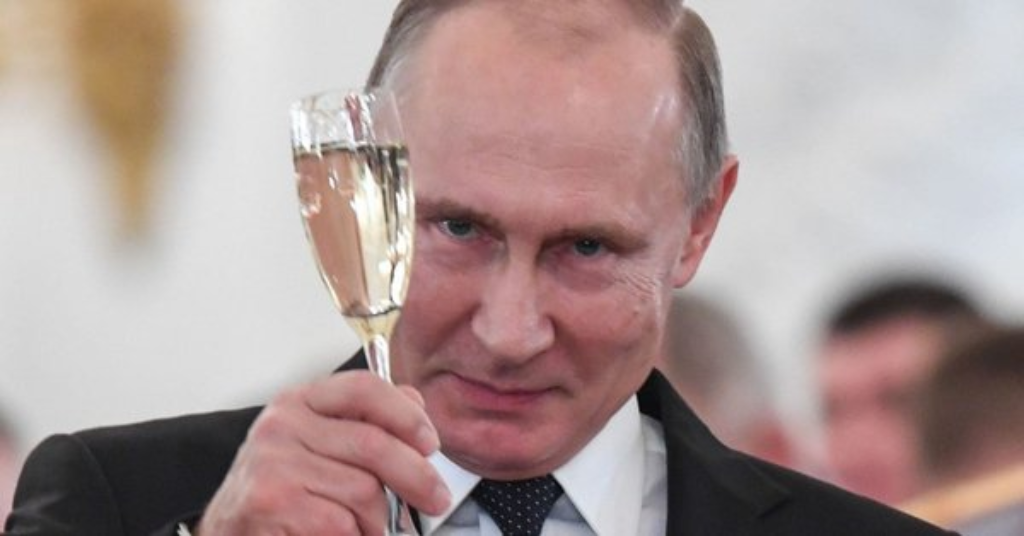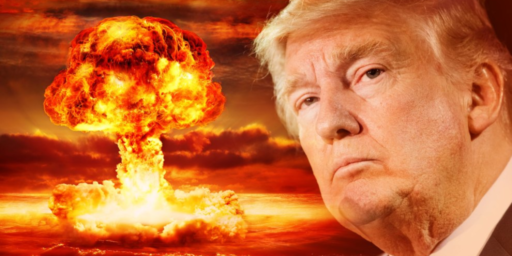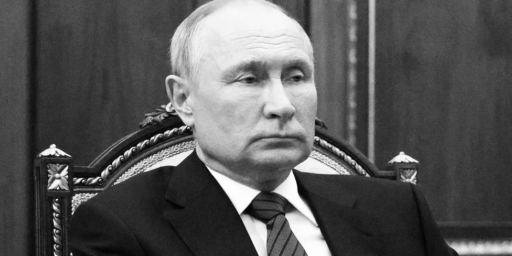Trump’s Withdrawal From The I.N.F. Treaty Is Exactly What Putin Wants
The American withdrawal from the I.N.F. Treaty gives Vladimir Putin exactly what he wants.

One day after the United States announced that it was beginning the process of pulling out of the Intermediate-Range Nuclear Forces Treaty, Russia has announced that it is doing so as well:
MOSCOW — President Vladimir V. Putin of Russia, in a decision that was widely expected, suspended his country’s observance of a key nuclear arms control pact on Saturday in response to a similar move by the United States a day before.
But adding to a sense that the broader architecture of nuclear disarmament has started to unravel, Mr. Putin also said that Russia would build weapons previously banned under the treaty and would no longer initiate talks with the United States on any matters related to nuclear arms control.
The Trump administration withdrew from the treaty, a keystone of the late Cold War disarmament pacts known as the Intermediate-Range Nuclear Forces Treaty, saying that Russia had been violating it for years. The decision holds the potential to initiate a new arms race, not only with Russia, but also China, which was never a signatory to the 1987 treaty.
Beijing responded to the American announcement by warning on Saturday that the breakup of the treaty would undermine global security, but also by rejecting calls for China to join an expanded version of the pact.
In a televised meeting on Saturday with his ministers of foreign affairs and defense, Mr. Putin said Russia would, indeed, design and build weapons previously banned under the treaty — something the United States says Russia is already doing — but would not deploy them unless America did so first.
“I would like to draw your attention to the fact that we must not and will not let ourselves be drawn into an expensive arms race,” Mr. Putin told his ministers. Money to build the new missiles, he said, will come from the existing defense budget.
The treaty had prohibited the United States and Russia from testing or deploying land-based missiles able to fly in what are known as short or intermediate ranges: 300 to 3,400 miles. Both countries have sea- and air-launched missiles that fly in these ranges.
The minister of defense, Sergei K. Shoigu, suggested that Russia in coming months design and test a land-based launcher for its maritime cruise missile, called the Kalibr, an analogue to the American Tomahawk, and a new short-range ballistic missile.
“I agree,” Mr. Putin said. “Our response will be symmetrical. Our American partners announced that they are suspending their participation in the I.N.F. Treaty, and we are suspending it too. They said that they are engaged in research, development and design work, and we will do the same.”
Mr. Putin also noted what he called progress on Russia’s development of new types of nuclear weapons not covered by the treaty, including a drone submarine called Poseidon that carries a massive thermonuclear warhead designed to detonate in shallow coastal waters, flooding the enemy’s ports and seaside cities with a radioactive tsunami.
In his remarks, the Russian minister of foreign affairs, Sergey V. Lavrov, presented a picture of the wobbly state of the whole architecture of American and Russian nuclear disarmament that had been erected over the past 50 years, beginning with the Anti-Ballistic Missile Treaty of 1972.
Mr. Lavrov suggested a number of treaties were in need of urgent review, such as the Nonproliferation Treaty that prohibits passing nuclear weapons technology to countries that do not already posses it. He argued that America had violated it by conducting nuclear deterrence training exercises with NATO nations that were not declared nuclear powers.
China’s array of nuclear weapons remains much smaller than the American and Russian forces, but Beijing has been upgrading and expanding its arsenal. Some critics of the intermediate nuclear forces treaty have argued that it unfairly ties the United States’ hands from responding effectively to China’s military buildup.
In October, President Trump cited China’s potential expansion as a reason the United States should consider quitting the treaty.
“If Russia’s doing it and if China’s doing it, and we’re adhering to the agreement, that’s unacceptable,” Mr. Trump said after a rally in Nevada.
In January, Global Times, a Chinese Communist Party-controlled tabloid newspaper with a heavily nationalist tone, reported that a People’s Liberation Army unit had carried out an exercise with an intermediate-range “ship killer” missile formally called the DF-26. China probably has 16 to 30 intermediate-range ballistic missiles, an annual Pentagon report on China’s military said last year.
This tit-for-tat response on the part of the Russians is hardly surprising. As things stand, the fact that the United States moved first to effectively bring about the end of one of the most effective arms control treaties in history gave them free rein to do whatever they please and something of a propaganda coup in being able to say that they were merely responding to what the United States had done. Additionally, the Trump Administration’s decision to pull out of the treaty basically allows the Russians to proceed forward with the activities that the U.S. has been alleging violated the treaty, and to expand on them without fear of being called out. This is significant given the fact that, so far, the vast majority of what the Russians have been accused of doing in violation of the treaty consists of testing and research rather than actual deployment. By pulling out of the treaty, the United States has given Russia the green light to deploy missiles that may violate the treaty wherever it likes and there will be nothing the United States can do about it. Additionally, as I noted yesterday, the United States presently doesn’t have any missiles that could be deployed in Europe or anywhere else that would counterbalance that threat, not to mention the fact that it’s unlikely that our European allies would agree to the deployment of nuclear weapons on their soil as they did with the Pershing II missile during the Cold War. In other words, this decision by the Trump Administration is a big win for Putin’s Russia, and a diplomatic failure for the United States.
As Aaron Blake put it in The Washington Post, there’s a reason why Vladimir Putin isn’t going to be upset with Trump for pulling out of the treaty:
Putin has repeatedly objected to the fact that other countries haven’t joined in the treaty. In 2007, during the George W. Bush administration, he said this, according to an Associated Press report:
“We need to convince other (countries) to assume the same level of obligation as assumed by the Russian Federation and the United States,” Putin said. “If we are unable to obtain such a goal … it will be difficult for us to keep within the framework of the treaty in a situation where other countries do develop such weapon systems, and among those are countries located in our near vicinity.”
Putin’s comments were similar in 2016. In an exchange captured by a Kremlin transcript, Putin called the leaders of the Soviet Union who forged the treaty with the United States in the late 1980s “naive” for its terms (emphasis added):
Q: Does Russia see any value in this treaty, and if yes, then what exactly? Is it even worthwhile to be part of this treaty?
PUTIN: It would be of great value to us, if other countries followed Russia and the United States. Here’s what we have: the naive former Russian leadership went ahead and eliminated intermediate-range land-based missiles. The Americans eliminated their Pershing missiles, while we scrapped the SS-20 missiles. There was a tragic event associated with this when the chief designer of these systems committed suicide believing that it was a betrayal of national interests and unilateral disarmament.
Why unilateral? Because under that treaty we eliminated our ground complex, but the treaty did not include medium-range sea- and air-based missiles. Air- and sea-based missiles were not affected by it. The Soviet Union simply did not have them, while the United States kept them in service.
What we ultimately got was a clear imbalance: the United States has kept its medium-range missiles. It does not matter whether they are based at sea, in the air, or on land; however, the Soviet Union was simply left without this type of weapons. Almost all of our neighbours make such weapons, including the countries to the east of our borders, and Middle Eastern countries as well, whereas none of the countries sharing borders with the United States, neither Canada nor Mexico, manufacture such weapons. So, for us it is a special test, but nevertheless we believe it is necessary to honour this treaty. All the more so since, as you may be aware, we now also have medium-range sea- and air-based missiles.
That doesn’t sound like someone who will be particularly unhappy without the treaty — which he argued was stacked against his country to begin with. The Russians’ flouting of the treaty contributes to the idea that this was punitive, but Russia in some ways seemed to be goading the United States to cancel it.
If that was the game plan all along, and given Putin’s penchant for chess-playing it’s quite likely that it was, then he’s once again succeeded beyond his wildest dreams.





You could probably take about 80% of Trump’s foreign-policy actions and append “is exactly what Putin wants” and be entirely correct 100% of the time.
Well, Beijing, screw you too.